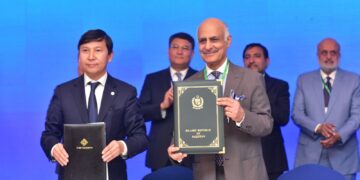Chairman of the Flour Mills Association (Sindh Zone) Chaudhry Amir Abdullah and Muhammad Yousuf, Patron-in-Chief of UBG, are meeting with Acting President of FPCCI Saqib Fayyaz Magoon. Mian Zahid Hussain and Mumtaz Ahmed are also present.
By MASOOD AHMED SIDDIQUI
Karachi: S.M. Tanveer, the Patron-in-Chief of the UBG, stated that the government should withdraw the irrational and impractical withholding tax imposed in the federal budget 2024-25 to expand the tax base and bring flour mills into the tax net. He emphasized that wheat is the most consumed food item, which is the staple food for the country’s 249 million people, and the FPCCI condemns any action that disrupts the supply chain of this essential commodity.
It is noteworthy that a high-level delegation of the Pakistan Flour Mills Association (Sindh) held a joint meeting with the FPCCI, presenting proposals to the government regarding changes in taxes imposed on flour mills. S.M. Tanveer explained that withholding tax has been imposed at a rate of 2.5% on non-filer retailers and 5.5% on flour mills, while they operate on a modest profit margin of 0.5 – 1.0%. Therefore, this tax imposition is not only beyond any economic principle but will also fail to increase tax collection. He further mentioned that FPCCI believes this measure could reduce tax collection from this sector.FPCCI Acting President Saqib Fayyaz Magoon emphasized that only a fixed tax within the range of 0.5 to 1.0% can work and increase national revenue. The FPCCI’s proposal is based on the belief that flour mills will be willing to pay the fixed tax, as it will not affect their supply chain, maintain their working capital, and make tax compliance easier. He also mentioned that flour mills were previously exempted from advance taxation under Section 153.FPCCI Acting President Saqib Fayyaz Magoon reiterated FPCCI’s stance that regressive taxes, which are difficult to comply with, can promote the practice of flying invoices. If the government does not address the legitimate concerns of flour mills, which are in the SME sector, they may resort to last-ditch efforts. He further added that expecting flour mills to act as withholding tax collection agents by the FBR is unjust, as it is not their role nor do they have the capacity.
Chairman of FPCCI’s Policy Advisory Board Mian Zahid Hussain highlighted that wheat flour falls under the category of fast-moving consumer goods (FMCG), where liquidity is crucial for flour millers. There is no way they can pay 5.5% withholding tax plus 2.5% and remain operational, which would result in thousands of flour mills shutting down across the country.
Chairman of the Flour Mills Association (Sindh) Chaudhry Amir Abdullah said that flour mills are already paying 0.25% turnover tax based on the units of electricity used. This tax is calculated on the total wheat grinding done in that month, as reflected in the flour millers’ electricity bills. This means flour mills are already contributing their share in taxes, considering their low-profit margins of less than 1%. He added that there is no example of such withholding tax in the region as imposed in Pakistan, and most flour mills in the SME sector have already suffered losses in the last quarter due to price fluctuations.

















